I remember watching a fair bit of Soviet cinema as a child. This was back in the late 1970s and 80s, when India and the USSR were bosom buddies. Soviet children’s literature filled our bookshelves and the occasional Soviet Film Festival meant that even before I turned 10, I’d already seen English-dubbed Russian cartoons. Later, when we got a TV, we saw several classics—Anna Karenina, War and Peace, and the like—on Doordarshan. Those, sadly (yes, literally sadly!) left me with a lasting impression of Soviet Cinema = Moroseness, Morbidity, Unrelenting Angst.
It struck me the other day that that couldn’t be all. So I set out to see what I could unearth, and I discovered several films that I liked a lot. Devchata (The Girls) is one of them.
Devchata is set in a lumber camp in Siberia. When the film opens, we see one of the supervisors escorting in a new arrival. This, a girl named Tosya (Nadezhda Rumyantseva), is the new cook. When she admits that this is her first job and that no, she hasn’t brought her pillow along, the supervisor is extremely put out. Pillows are in short supply, and a cook with no professional experience? Ugh! Tosya is quick to tell him that she’s graduated from the Culinary Centre in Simferopol; the implication being that she’s not to be sniffed at.
The supervisor shows Tosya to the cabin she’ll be sharing with a bunch of other women, all of them already resident. None are around right now—this in the middle of working hours—so, once the man has left (having tossed Tosya a pillow), Tosya quickly sets about exploring the cabin.
Or, more precisely, trying to figure out her roomies. The bed next to hers has a bedside table crowded with perfume bottles and cosmetics. Another bed, with a portrait of Pushkin pinned up above, has a set of shelves hung on the wall beside it, each shelf bursting with books. There’s yards of crochet spilling out of one box, and so on. These women, even when absent, seem to be an interesting lot.
Tosya, however, is hungry, so she rushes off to the stove at one end of the room, and starts to make herself a snack. She’s not even got the fire going when there’s a series of interruptions. First, a man delivers some mail for one of the women, Vera. Then, a few moments later, another man, a rather sedate and stolid-looking character comes by, places some edibles on a bedside table, and leaves.
Finally, just as Tosya is settling down to take a bite out of her snack, her roommates arrive. These are Vera, Katya, Nadya, and Anfisa.
They are startled to see this stranger sitting and making herself at home in their cabin. The glamorous Anfisa (Svetlana Druzhinina) swoops down angrily on Tosya and snatches up the glass in which Tosya has poured herself a drink—and which Tosya had borrowed from Anfisa’s bedside table. Anfisa is not welcoming: she does not like people making free with her belongings.
The others are sweeter and kinder. They welcome Tosya, and tell her not to mind Anfisa; she’s like that, it can’t be helped.
Tosya is happy to be finally making friends, so she cheerfully hands over the letter that had been delivered for Vera (Nina Menshikova)—a letter, it turns out, from Vera’s husband. Vera immediately tosses it into the stove, unopened. Tosya is taken aback; surely people who’re married would be looking forward to each other’s letters? You can’t be married and not be deeply in love, can you?
To tide over this embarrassment, Tosya remembers to point out the stuff left behind by the second man who’d come by. ‘Mangy’ is the word Tosya uses to describe him, only to learn, the very next moment, that the man in question is the fiancé of Nadya (Inna Makarova). Tosya, with whom tact is not a strong point, wonders how anybody could have a fiancé like that, and Anfisa, who’s busy doing up her makeup, says that “when you’re 28 years old and still unmarried, like Nadya, even a goat will do.”
Ouch.
Fortunately for Tosya, other than Anfisa, her roommates are nice women (and, importantly, forgiving). That evening, they take her along to the local community hall, where there’s dancing and music. Tosya, small and none too striking, however, gets overlooked by all the men; when she finally gets sick of being a wallflower, she turns to the only other person around—a tall woman, standing as alone as Tosya is—and begins dancing.
… Only to stop, the very next minute.
This is because the music has stopped. While Tosya’s been standing around, the local ‘best woodcutter’, Ilya (Nikolai Rybnikov) has entered, with his three buddies, who form his brigade. (Each brigade not just works together as a team, but also lives together).
In the hall, Ilya and his boys come face to face with their rival brigade, which is headed by Filya (Stanislav Khitrov). Filya and Ilya, as is usual with them, begin to play a game (of what looks like draughts to me). And Ilya, whenever he finds it difficult to concentrate, summarily has one of his boys turn off the music.
When Tosya realizes what’s happened, she strides indignantly across and turns on the music again.
This is repeated a couple of times, with Tosya getting more and more annoyed each time Ilya has the music stopped. He, too, is annoyed, but more than that—because he’s used to swaggering about and having everybody kowtow to him—Ilya is also intrigued.
More so when, beckoning to Tosya with a bent forefinger, he finds that she, instead of coming over obediently, summons him, bent forefinger and defiant (even somewhat mischievous) expression and all.
Ilya goes over to Tosya, and as they stand there, face to face, sizing each up, he asks Tosya if she’ll dance with him. Tosya is momentarily taken aback, but rebounds. With that cigarette in his hand? Ilya stubs it out and tosses it away. With that cap on his head? Ilya takes it off and tosses it away, too. But when he puts out a hand to begin the dance, Tosya turns away.
It’s quite an insult, and Ilya is not one to take it lying down. He is too chivalrous to try any caveman tactics, so he strides out of the hall, accompanied by his boys. Filya, running after them, incites Ilya: Ilya mustn’t let this go. He must have his revenge. How can this slip of a girl insult him so?
And, just like that, within minutes, a bet is laid between Ilya and Filya. If Ilya can make Tosya fall in love with him within a week, Filya will give Ilya his hat.
The next day at lunchtime, everybody flocks into the canteen, where—at the hatch—Tosya is hard at work ladling out soup. Ilya and his brigade come in, sniff disapprovingly at their bowls of soup, take a sip, and immediately declare that it’s horrible. Made of frogs, probably. The four men (the others follow Ilya’s lead in all of this) take their bowls out of the cabin and pour the soup into the snow before leaving.
Although everybody else seems to like the soup, poor Tosya is depressed and weepy. Katya (Lyusyena Ovchinnikova), who’s been helping out, tries to console her: the soup was tasty. This is just Ilya’s way of taking revenge for the way Tosya treated him at the community hall last night. Tosya is not convinced.
Meanwhile, Ilya has decreed that he and his brigade will boycott Tosya’s cooking. It’s not as if they’ll go hungry; basic foodstuffs are available at the local shop. The youngest of the brigade is deputed to fry eggs (in a pan borrowed from Filya’s brigade, which lives across the partition under the same roof). Unfortunately, as this operation is underway, a brainwave strikes Ilya: they can increase their productivity in tree-felling, and thus get better salaries, if they use so-and-so method… everybody gets so excited about this that the eggs are forgotten.
Despite the burnt eggs, Ilya is adamant: they won’t go to the canteen. They can eat bread and sausage when they take a break; a lack of hot food isn’t going to kill them.
They haven’t reckoned with Tosya, though. The next day, once lunch service is done, Tosya fills up a large kettle with mushroom soup, packs some bread, and against the protests of Katya (“Haven’t you any self-respect?!”), sets off towards where Ilya and his men are working. Ilya’s men have, by now, begun hankering for hot food, so the sight of Tosya bearing soup and bread makes them leave their machinery and come eagerly forward. Within minutes, Ilya too has capitulated.
By the time she leaves them to finish their lunch, Tosya has made friends with the entire bunch. Ilya, with a grin, has declared her soup ‘edible’. Triumph!
The next thing Tosya knows, when she’s leaving evening classes, Ilya accosts her on the way and asks if he can walk her back to her cabin. It is obvious to even naïve little Tosya that Ilya is attracted to her, and she’s over the moon.
Not so fast, warns Katya, when she realizes what’s happening. Doesn’t Tosya know that Ilya is a playboy? He treats women like playthings, flitting from one to another.
Tosya is aghast, and unsure: Ilya doesn’t strike her as a libertine. Don’t get taken in, says Katya. To make sure that Tosya remains on her guard, Katya takes it upon herself to be around Tosya all the time—and to cough loudly every time she thinks Tosya is in danger of succumbing to Ilya’s charms.
So we proceed. Tosya getting more and more starry-eyed with every passing hour, Katya coughing frantically. And neither of them aware of that bet between Ilya and Filya…
What I liked about this film:
Everything, really (which is why there’s no ‘What I didn’t like’ section to this review). Devchata is a light-hearted, sweet and just generally endearing film, which mixes humour and romance very well. There’s a lot to like about this film, but some things in particular stand out:
First and foremost, the scripting, which is fast-paced and good. There are funny things happening throughout the film—what might seem as isolated episodes of humour, like Tosya’s inadvertently referring to Nadya’s fiancé as ‘mangy’—but each of these episodes somehow adds to the story and helps build the plot or contribute to character development. (The ‘mangy fiancé’, for example, is an interesting insight into the life of Nadya, who is too scared of ending up an old maid, and so has had to settle for a man who may not be considered a ‘fine catch’, but who is, in his own way, loving and devoted to her). There is very little here that is superfluous.
Also to be appreciated is the way other facets of life are woven into the narrative; the tone may be frothy, but beneath the fluff is hard truth too. Anfisa, for instance, whose flippant and flirtatious attitude towards men lies in her own insecurities. Or the fact that nobody in this film is utterly and absolutely black or white. Everybody is human, with their own frailties and strengths, their own ability to find happiness where they can. Their ability to forgive and move on, to hold on to what life gives them. Occasionally, too, to reach for what may seem out of their reach.
And there is Nadezhda Rumyantseva, who is a total firecracker as Tosya. She is feisty, unafraid (the way she faces up to Ilya in the community hall, when a roomful of dancing couples cannot summon up the courage to oppose his high-handedness)—and yet she is also sweet, emotional, with a beguiling innocence that is a delight to watch. Add to that the fact that she’s very physical, jumping about, striding around, climbing up stools… she reminded me in many ways of one of my favourite comic actresses in Hollywood, the delightful Judy Holliday in Bells Are Ringing.
If you want some good, light viewing, give this a try. It’s a great mood-lifter.

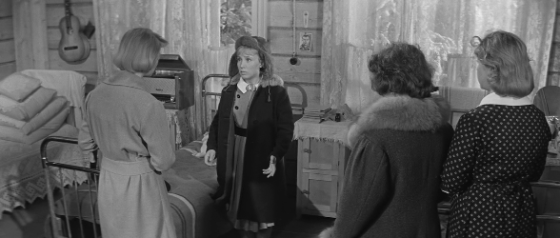
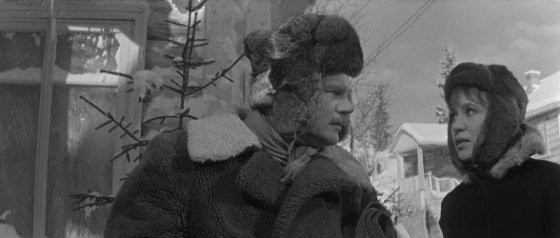
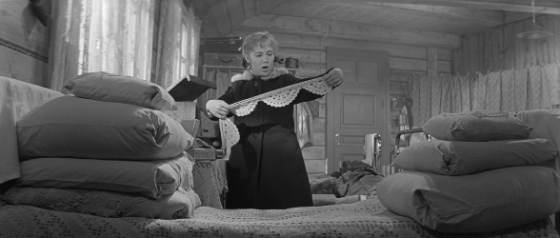
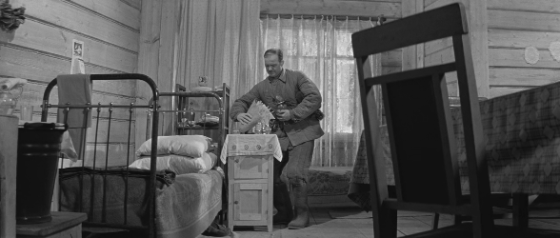
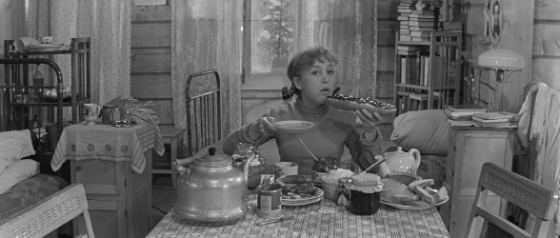
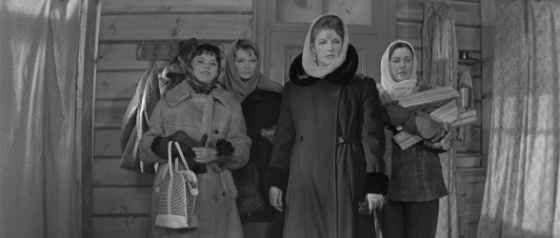
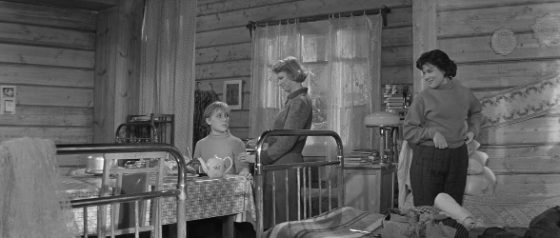
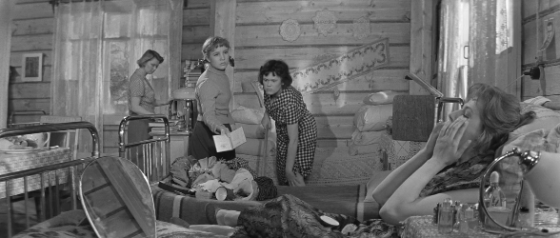
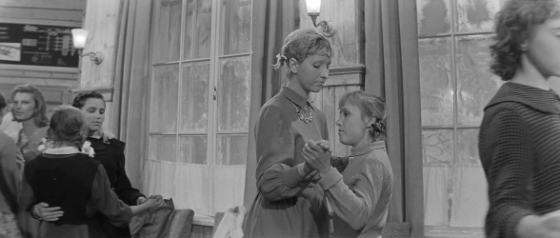

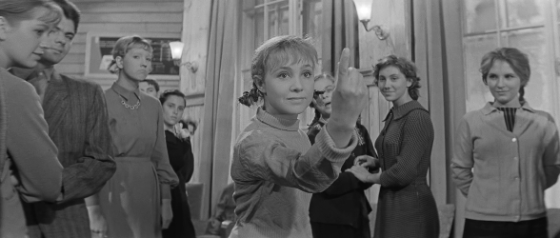
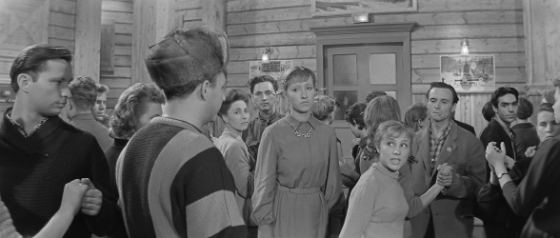
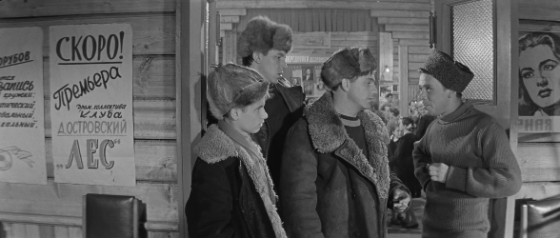
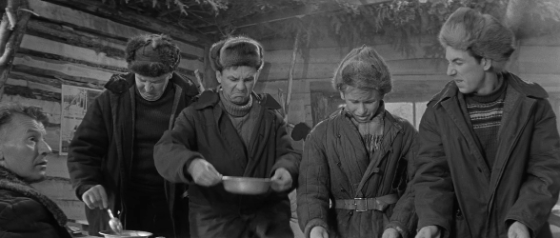
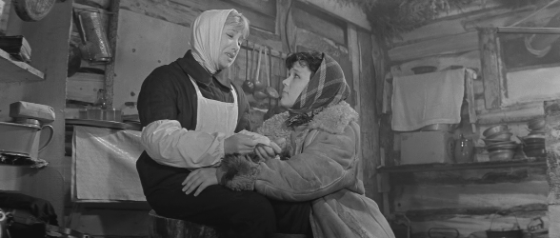
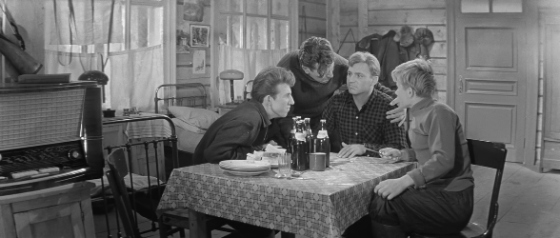
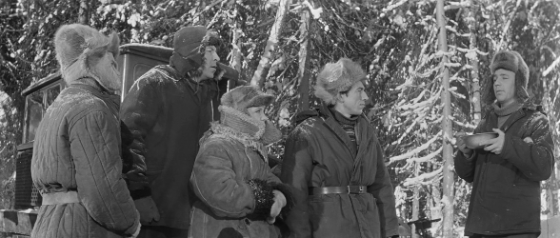
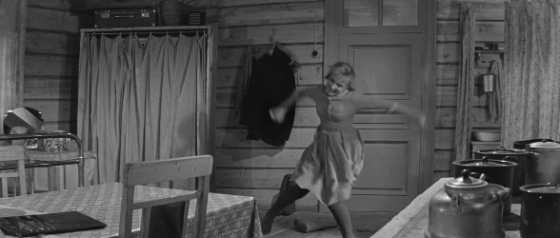
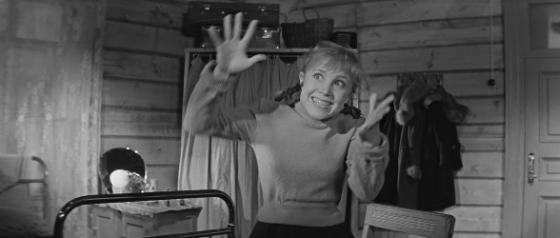
Going through a very emotionally exhausting period at this point. I need to watch. But oh, not going to happen for a long time now. :( Ah, well, your review will have to do.
LikeLike
Anu, poor you! I hope things get better soon. *hugs*. As someone else commented on this review, this is a go-to film for depressing days… so if you get an hour and a half someday, do try and watch this. Even though it won’t solve your problems, it may just help lift your mood a bit.
LikeLike
You are rarity! Who does reviews of such old movies, in so great details?!
LikeLike
Several people, actually. Have a look at my blog roll – lots of people there who almost exclusively review only old cinema. :-)
LikeLike
O, thanks for this post! Devchata was one of the best-loved film of my childhood and still now if I’m upset I see any 10 minutes from it as antidepressant:) There are some other very sweet soviet romantic comedies from 1950-s and the beginning of 1960s but most of other are color movies and now their colors don’t look very good and Devchata is black and white and it is the big benefit.
LikeLike
I am so glad to find someone else who loved this film! I only discovered it recently, and watched it one night. Most of the time, I end up watching part of a film on one day, and the rest the next day. This one, I couldn’t stop until it was over – I was glued to it! So utterly enjoyable.
I also have The Diamond Arm lined up to watch. Have you seen that one? Or are there any others you’d specifically recommend (even if they are not-that-great coloured)? I’d be grateful for any suggestions!
LikeLike
Yes, I have seen The Diamond Arm – it’s a bit slapstic comedy, I would tell something like It’s a Mad, Mad, Mad, Mad World – a lot of strange people hunting agter a treasure:) It is cult movie in Russia by the way:) From other old soviet movies I suppose you can like Give me a complaints book (for me it is an ideal romcom), Beware of the Car (a little bitter-sweet comedy) and True Friends (not romantic but very nice movie about three old friends on the float-boat). I’m not sure that they are subtitled in english but I hope that yes.
LikeLike
Yes, I had heard that The Diamond Arm was a cult movie. And I have a weakness for films that combine crime with humour – some of my favourite films from across the world – Hindi, Hollywood, Italian cinema – are of that kind. And, thank you so much for the other recommendations – I will look out for them, and I hope I can find subtitled versions. Thanks. :-)
LikeLike
I remember having watched several good Russian films during the ‘buddy’ period. This one sounds really nice. Will try to catch it.
LikeLike
Do, Ava, do! I think you’d like it. It’s a thoroughly endearing film, and Tosya is such a lovable heroine.
LikeLiked by 1 person
Beautiful review Madhu didi! Its almost like as if you have this innate ability to understand the language of cinema… No one can understand and interpret a movie in this manner based only on subtitles.. I totally agree with Mr Sandip Roy didi :)
As you must know by know didi I haven’t really seen many foreign movies.. But having read this book by Satyajit Ray called Deep Focus, I knew the names of Soviet directors like Sergei Eisenstein and Alexander Dozhvenky. Owing to the influence of Communism on their thought processes I think their movies did tend to be rather serious and gloomy and of the intellectual type.. But as this movie has shown it’s wrong to judge a whole nation’s cinema based on a few prominent movies, just like we can’t say all our Bollywood films have item numbers and stuff.
But thank you so much for this review didi.. Its brilliant!
LikeLike
But as this movie has shown it’s wrong to judge a whole nation’s cinema based on a few prominent movies, just like we can’t say all our Bollywood films have item numbers and stuff.
Good analogy, yes! The problem, I think, is that a lot of films that become talked about outside the country in which they are made tend to be the films of the auteurs: so many foreigners, for instance, who don’t really know Indian cinema, tend to categorise it into either of two extremes: Satyajit Ray, or masala flicks. Which is a real shame, because so many lovely and entertaining cinema (much of Hrishikesh Mukherjee, for instance) falls in between those two ends of the spectrum.
But perseverance pays. :-) I’ve found some really good foreign films over the past few years – and, as I mentioned in an earlier post, there are plenty of films that speak a universal language – they (like Devchata) are so much about human nature in general that you don’t need to be of that culture, let alone understand the language, in order to appreciate the film.
LikeLike
Hmmm yes didi I got it! :)
LikeLike
Sounds like a sweet film, back in the good old days of Doordarshan, there used to be a programme, unfortunately I have forgotten the name of the programme, films from all over the world were telecast and after the telecast there used to be a discussion with some eminent people well-versed in cinema, Quite a number ofRusssian and Czech films were telecast in that programme. I actually miss those days nowadays television is all about serials that are pretty much mindless. Earlier I used to watch a few English serials but now barring a few I find the storyline of the English serials too repetitive.
LikeLike
I must admit the only TV programme I now watch is Masterchef Australia – I just don’t have the time for anything else. But yes, back in the good old days of Doordarshan, there used to be some good foreign movies shown. I don’t remember the programme you mention, but I do remember some of the foreign movies I saw back then.
LikeLike
When I first read the title, I thought, what is this movie, God’s Umbrella? In the next line, I realised it is a Russian title. Thank God, I didn’t think it was God-Licked or God-slapped for that matter!
This seems to be a very entertaining movie. Quite predictable, but lovely.
If I get a chance, I’ll surely watch it.
LikeLike
“Thank God, I didn’t think it was God-Licked or God-slapped for that matter!”
LOL! Harvey. :-D you’re a scream!
It is predictable (and somehow that ‘betting on love’ is something so familiar to viewers of Hindi cinema, isn’t it?) – but yes, it’s entertaining, and it’s really sweet, too. Not all froth and frivolity, and I’d watch it just for the lead actress – she’s a darling.
LikeLike
A Russian rom-com that you describe as delightful? Sold! I wish I had read this review over the weekend when my Mom and I were hunting for a “nice, happy” movie to watch together. Ah well, better late than never. :-)
LikeLike
I think you’ll like this one, Shalini! It’s not ‘laugh out loud funny’ (though there are bits that are that, too) but when it comes to ‘nice, happy’, it certainly fits the bill. :-) Next weekend, perhaps?
LikeLike
after reading the tittle i felt that its a marathi movie. devchata marathi pronunciation. in old times even people who only read Indian literature could tell name of Russian writers like my mother . she told me writers name and said that books of Russian writers used to get translated in Indian languages. seems like a good movie. will watch it after recovering, i am happy to know about this movie. the last old English movie i watch was sorry the wrong number 1948.
LikeLike
I hope you get to see it, and I hope you like it.
LikeLike
OMG! WOW!
Sorry for such unarticulated start – I couldn’t believe my eyes when I saw the title and the pictures! THAT I didn’t expect!
DEVCHATA just happened to be one of my all-time favorite movies (in fact, I believe I can quote every line by heart – and the songs, too!) – and one of most beloved movies in Russia! Every actor in it is a legend and among the favorites!
I think I will retire the exclamation points for now…
Your review was just SO right on the spot it’s hard to believe you’ve never seen any other Russian comedies of that period. You even managed to surprise me with some details and descriptions that I never noticed (and I’ve seen this movie a zillion times!).
With your permission, can I add some trivia?
Tosya is only 18 years old; however, Nadezhda RUMYANTSEVA was nearly 30 when he played her. By then, she was an established actress; she got this part without any audition, it was written for her (which was quite rare in Soviet times). Nikolay RYBNIKOV (Ilya) was a legend, hugely popular in late 50s actor – whose star actually started to fade by early 60s. The professional competition between him and Rumyantseva made the shooting uncomfortable at first – but soon they made peace and proceeded smoothly.
Svetlana DRUZHININA (Anfisa)also had some resentment to deal with – both from producers and from Rybnikov. She had to prove herself to both – and she did so, splendidly!
Inna MAKAROVA didn’t like the way her role was cut short, she didn’t even attend the premiere. In original ending, she’s leaving her fiancee – and Makarova felt it was necessary to include in the movie; it was essential in understanding the depth of her character. Director thought it will mar the tone of the comedy and decided against it. Makarova stopped talking to him for a while.
Now, of course, all that doesn’t really matter – because this movie found its permanent place in the hearts of movie lovers not only in Russia but – I am VERY happy to say this – in the world!
I especially appreciated that you singled out all the actors by giving their names – they deserve such honor, truly. Sadly, most of the actors and the director passed away. Thankfully, Inna Makarova and Svetlana Druzhinina are still with us. The latter is actually more famous now for being a great director, her movies are among classics! Inna Makarova was the first wife of Sergey Bondarchuk, the director of WAR AND PEACE (he also played Pier Bezukhov) and DESTINY OF A MAN (what a movie that is! HIGHLY recommended!)
LikeLike
I am so glad I ended up reviewing a film you like so much, Alisa! This was such a delight, and I enjoyed it so much. Most of the time, I watch films in fits and starts – half an hour today, half an hour tomorrow, and so on. But Devchata (which, thankfully, I began watching on a Saturday night) had me hooked right from the very start, so I watched it all in one go. What a little gem of a movie.
And thank you for all that interesting trivia about the film! I did read (I think on IMDB) about Rumyantseva being 30 (though I think she played a fairly convincing 18), but the rest was all new to me. Thank you (also for the recommendation of Destiny of a Man – I shall look out for that!
LikeLike
Another funny bit of trivia for you, Madhu. When SEETA AUR GEETA was dubbed in Russia, it was Nadezhda Rumyantseva who dubbed for Hema Malini! So, until I watched this film in Hindi just last year, for me Hema always had Rymyantseva’s voice (of course, her real voice couldn’t be more different from the latter’s!).
LikeLike
Wow! That is such an interesting bit of trivia. :-D Thank you!
LikeLike
Madhu, since you liked RUMYANTSEVA so much, would you be interested in her other memorable roles? I’ll give you a short list – and you may do with it what you will :)
1. THE UNRULY ONES (1959) / НЕПОДДАЮЩИЕСЯ
2. THE QUEEN OF GAS STATION (1962) / КОРОЛЕВА БЕНЗОКОЛОНКИ
3. THE HARD NUT (1967) / КРЕПКИЙ ОРЕШЕК
These are her major films. She didn’t make many but they were all delightful and sweet, just as she was herself!
I am not sure if any of them are subtitled but the sentiments and the events in these films are universally understood – so I hope you’ll give them a try!
If you need any help with choosing Soviet films to watch, I hope you wouldn’t hesitate to give me a (virtual) holler. All modesty aside, I consider myself somewhat of a movie buff, especially, when it comes to Russian cinema :) Best wishes!
LikeLike
Ooooh, thank you, thank you, thank you! *scurries off to see what is available* I do hope I can find at least one of these with subtitles. And yes, do please keep the recommendations coming – ever since I began watching (in earnest) non-Bollywood, non-Hollywood, films a few years back, I am always looking for recommendations. The problem too often is that the sort of films that make their way to ‘best of foreign cinema’ lists are the heavy, auteur-ish type, which don’t always make for enjoyable viewing. Yes, much as I was impressed by Battleship Potemkin, I doubt if that’s a film I would want to watch again and again.
LikeLike
You’re very welcome, Madhu! It’s my pleasure :)
I absolutely agree with what you said about heaviness and sort of exclusiveness of films that are being presented as “best of so-and-so cinema” – and Soviet/Russian movies are, of course, no exception! When I lived in Russia, we used to watch movies from all over the world: from Japan and Egypt to Greece and Cuba! With a very few exceptions, I can hardly recall anything enjoyable about those movie – although, I don’t doubt their artistic and cinematic merit and importance.
As you know, movies from India were tremendously popular in Soviet Union/Russia (they still are!) – but the vast majority of them were masala films. Being extremely enjoyable, they, nonetheless, formed a somewhat unfair view of Indian cinema as being all about songs and dances combined with very dramatic and heartbreaking storylines. Not until I started watching Sanjeev Kumar’s movies, I realized how narrow-minded and uneducated on this subject I was!
In the light of what I’ve said, I’d be happy to recommend some wonderful lighthearted Soviet comedies to you so that you may enjoy a different side of Russian cinema :) I dug around and tried to find some subtitled ones – so here you go:
1. THREE PLUS TWO
2. A LIVELY VOYAGE
3. GENTLEMEN OF LUCK
These are the best – but there’re many more! Alas, not a lot of them are subtitled but if you’re feeling adventurous, let me know – I’ll be ready with more choics :)e
LikeLike
“formed a somewhat unfair view of Indian cinema as being all about songs and dances combined with very dramatic and heartbreaking storylines.”
So true! I remember, a few years ago, I met a Brazilian writer at a writers’ residency, and when he discovered that I was a fan of old cinema, he said, “Isn’t all Hindi cinema completely escapist, only song and dance?” So I gave him a couple of DVDs as gifts. Anokhi Raat was one, Pyaasa was another. Later he wrote back to say that he and his friends watched them and were pleasantly surprised, because the films were nothing like what they’d expected.
Not that it’s always like that – for instance, I remember deliberately not watching any Kurosawa for years, because I was under the impression that anybody whom the critics praised so much couldn’t possibly have made anything that would make sense to me! And then I watched Seven Samurai, The Hidden Fortress, and High and Low… and now Kurosawa ranks as one of my favourites.
But, to come to the most important part: thank you so very much for taking the trouble to actually find those subtitled movies for me on Youtube! I’ve bookmarked them already, and intend to begin watching them soon. Spaseeba!
LikeLike
Madhu, as always, you’re most welcome!
As you know, ANOKHI RAAT is also one of my favorites, and I started watching PYASSA but didn’t quite get through because there were no subtitles (but I fully intend to finish watching it!). Indeed, it is so ironic that people often dismiss foreign movies that are being praised by critics – but, perhaps, not without a reason (which you covered in your previous posts completely).
It seems like we’re now on a self-imposed mission to bring good cinema to its rightful audience – and it’s a rewarding and satisfying process! :)
LikeLike
“It seems like we’re now on a self-imposed mission to bring good cinema to its rightful audience – and it’s a rewarding and satisfying process! :)”
Absolutely! I was telling a reader (who is wary of watching ‘foreign cinema’) that there’s a lot of foreign cinema that would appeal to anybody who liked Hindi cinema (given that all Hindi cinema is not escapist fluff), so I’m on a mission to compile a list of films from across the world that would almost certainly please anybody who liked the films of, say, Bimal Roy, Hrishikesh Mukherjee, Raj Khosla, Vijay Anand, etc. Some good comedies, some good romances, some great suspense – and some foreign masala too.
LikeLike
Full speed – and best of luck!
Let me know if you need any assistance from me – I’d be happy to oblige :)
You know, with all this talk about Soviet cinema meaning almost exclusively Russian movies, I neglected to bring to your attention the fact that during Soviet period there were many thriving regional film studios that made most amazing and memorable movies. Among them, the best were movies from Armenia and Georgia (and speaking of appealing to Indian audiences – most definitely!).
The Baltic studios were good but they usually produced movies based on American or English books and plays or something from the local writers. The Asian region (Uzbekistan, Tajikistan, Turkmenistan) were best at making fairy tales based on Arabian nights or some historical material with Middle Eastern flair (they were wonderful!).
When I think about these films, it makes me sad to realize that all the richness of culture, the diversity, and the colorfulness are gone forever – but I fondly remember the time when all those countries were a part of one big Union – the one that I called Motherland.
If you ever feeling inclined to find out more about those films, you needn’t look too far! :)
LikeLike
Interestingly, not too long back, a friend (who also used to once blog on Hindi cinema, but now is too caught up in Korean dramas to do anything else) was mentioning to me how very angry a Ukrainian friend of his would get if anyone tried to suggest that Ukraine was ‘Russian’. (This, because I accidentally named Ukrainian Folk Tales as one of my favourite ‘Russian’ books from my childhood). Even calling it ‘Soviet’, said my friend, wouldn’t be absolutely acceptable, because these people were so proud of their own distinct ethnicity.
I hadn’t realised, though, that they had definite regional cinema industries of their own. That must be fun! Do, please, bring on the recommendations. :-) Thank you so much.
LikeLike
Dear Madhu, what happened to your friend is, alas, quite typical. Without delving too deep into political stuff, the issues between Russians and Ukrainians were always a volatile topic, and more so in the light of recent events taking place in Ukraine. That person who snubbed your friend is likely from the Western part of Ukraine famous for it’s anti-Soviet, anti-Russian, and pro-fascist views. This outburst is a sign not of ethnic pride but rather comes from the misguided notion of ethnic superiority (made famous by a man named Hitler – and during WWII many western Ukrainians were traitors who embraced Nazis). This is the issue in a nutshell, Madhu.
Yes, the regional cinema was very formidable; a lot of actors made it big in Russia. I guess, it’s very much like Indian movies: you have your Telugu, Tamil, Gujarati, Punjabi and so forth films and stars – but unless they make it in Bollywood in Hindi movies, they don’t really become big stars :) Same was the case with those actors from local studios: they made wonderful films but the movies had to be translated in Russian in order to become popular; the actors who spoke Russian became more famous and in demand.
I will work on the list for you – and, perhaps, even re-discover some of those gems myself. :)
LikeLike
I hadn’t known about that notion of ethnic superiority among the Ukrainians, Alisa; thank you for telling me about that. Of course, I should have realized that things would be bad between Russians and Ukrainians – considering recent politics in the region (though my friend was talking about an incident that seemed to have happened years ago… I suppose, Kashmir-like, people’s feelings and resentment don’t really change, even if political situations manifest those feelings only later).
Thank you so much for your insights. :-)
LikeLike
Madhu, for some reason, I cannot post my comment (I’ve tried several times – so I hope it won’t eventually show up in different places!) but I get the message that it’s posted somewhere :( And I so wanted to give you this list of movies! Oh, well… I’ll try again later.
LikeLike
WordPress (probably because there were three URL links in your comment) decided on its own that they were spam. I’ve retrieved it, so it’s showing up now. :-)
LikeLike
Thank you for this post. This has been an old favorite of mine. Another country to watch for is Mongolia…would recommend Mongolia movies like “the story of the weeping camel”, “khadak”, “yellow colt”. As for Russian movies, I found the osterns to be more enjoyable (as opposed to the Hollywood westerns). Check out “White Sun of the Desert”!
LikeLike
Thanks so much for the recommendations! Now I’m really keen on watching some of the Mongolian films – and White Sun of the Desert, too, which I’d heard about, but haven’t seen so far.
LikeLike
Thanks for watching our movies :-)
LikeLike
:-) Thank you for making such good movies! (which reminds me, it’s about time I watched another Russian movie).
LikeLike